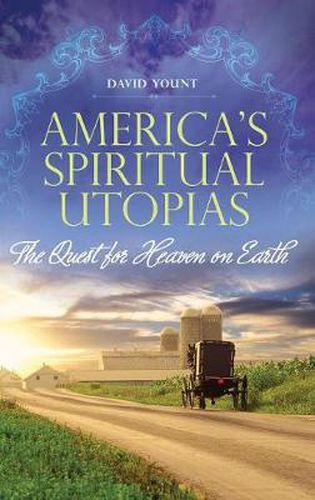Readings Newsletter
Become a Readings Member to make your shopping experience even easier.
Sign in or sign up for free!
You’re not far away from qualifying for FREE standard shipping within Australia
You’ve qualified for FREE standard shipping within Australia
The cart is loading…






There are some 20,000 utopian communities in present-day America. Most of them keep a low profile, welcoming new members without advertising for them. Nearly all are hidden from view - in rural America, in city slums, behind monastery walls. A majority of them are motivated by religious faith and seek to approximate heaven on earth. Some are startlingly successful. Utopian communities share a belief in the essential goodness of human nature and the possibility of personal perfection. The glue that binds them is not coercion, but commitment. Most are radically egalitarian. Their members are persuaded that their individual interests coincide with the values of the group, which stands in the place of God. The earliest Christians embraced a communal life of mutual caring, prompting pagans of the time to marvel, See how they love one another. Contemporary spiritual communities in America enjoy the same motivation. For a disconnected society obsessed with unfettered freedom and acquisitiveness, they demonstrate the power of fellowship and sharing over individual isolation and narrow self-interest. These are their stories.
From the outset, settlers freed from the cynicism of the Old World welcomed the opportunity that beckoned in the New. The Puritans conceived of Massachusetts as the biblical City on a Hill. The Quakers made Pennsylvania a Holy Experiment. Like the Israelites before them, the Mormons trekked through a desert to create an empire of the spirit. Even failed utopias offer lessons. The Shakers are remembered today for their furniture, tools, and songs, but in their time they attracted thousands to a devout life of simple abundance in community. It was only because they were celibate that their numbers decreased. By contrast, the Amish still thrive because their birth rate is three times the national average. Today there are 660 Amish congregations across 20 states - 14,000 of the simple farmers in Lancaster County, Pennsylvania alone. Most of the communes that flourished in the counter-culture of the 1960s and 70s failed for lack of resources and rules. But some, motivated by spirituality rather than anarchy, have become models of self-sustaining modern Edens. Here, Yount describes the history and place of several utopian communities in America, offering a glimpse into their lives, beliefs, and the ideas that sustain them.
$9.00 standard shipping within Australia
FREE standard shipping within Australia for orders over $100.00
Express & International shipping calculated at checkout
There are some 20,000 utopian communities in present-day America. Most of them keep a low profile, welcoming new members without advertising for them. Nearly all are hidden from view - in rural America, in city slums, behind monastery walls. A majority of them are motivated by religious faith and seek to approximate heaven on earth. Some are startlingly successful. Utopian communities share a belief in the essential goodness of human nature and the possibility of personal perfection. The glue that binds them is not coercion, but commitment. Most are radically egalitarian. Their members are persuaded that their individual interests coincide with the values of the group, which stands in the place of God. The earliest Christians embraced a communal life of mutual caring, prompting pagans of the time to marvel, See how they love one another. Contemporary spiritual communities in America enjoy the same motivation. For a disconnected society obsessed with unfettered freedom and acquisitiveness, they demonstrate the power of fellowship and sharing over individual isolation and narrow self-interest. These are their stories.
From the outset, settlers freed from the cynicism of the Old World welcomed the opportunity that beckoned in the New. The Puritans conceived of Massachusetts as the biblical City on a Hill. The Quakers made Pennsylvania a Holy Experiment. Like the Israelites before them, the Mormons trekked through a desert to create an empire of the spirit. Even failed utopias offer lessons. The Shakers are remembered today for their furniture, tools, and songs, but in their time they attracted thousands to a devout life of simple abundance in community. It was only because they were celibate that their numbers decreased. By contrast, the Amish still thrive because their birth rate is three times the national average. Today there are 660 Amish congregations across 20 states - 14,000 of the simple farmers in Lancaster County, Pennsylvania alone. Most of the communes that flourished in the counter-culture of the 1960s and 70s failed for lack of resources and rules. But some, motivated by spirituality rather than anarchy, have become models of self-sustaining modern Edens. Here, Yount describes the history and place of several utopian communities in America, offering a glimpse into their lives, beliefs, and the ideas that sustain them.